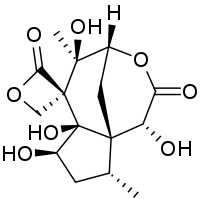Anisatin
Anisatin is an extremely toxic, insecticidally active component of the Shikimi plant.[1][2] The lethal dose is 1 mg/kg (i.p.) in mice.[3] Symptoms begin to appear about 1–6 hours after ingestion, beginning with gastrointestinal ailments, such as diarrhea, vomiting, and stomach pain, followed by nervous system excitation, seizures, loss of consciousness, and respiratory paralysis, which is the ultimate cause of death.[4]
 | |
| Names | |
|---|---|
| IUPAC name
(1′S,2′R,3S,4′R,5′R,7′R,8′R,11′R)-4′,5′,7′,11′-Tetrahydroxy-2′,7′-dimethyl-9′-oxaspiro[oxetane-3,6′-tricyclo[6.3.1.0¹,⁵]dodecane]-2,10′-dione | |
| Identifiers | |
CAS Number |
|
3D model (JSmol) |
|
| 3DMet | |
| ChEMBL | |
| ChemSpider | |
| ECHA InfoCard | 100.208.646 |
| KEGG | |
| MeSH | Anisatin |
PubChem CID |
|
CompTox Dashboard (EPA) |
|
InChI
| |
SMILES
| |
| Properties | |
Chemical formula |
C15H20O8 |
| Molar mass | 328.317 g·mol−1 |
| log P | -1.894 |
| Acidity (pKa) | 12.005 |
| Basicity (pKb) | 1.992 |
Except where otherwise noted, data are given for materials in their standard state (at 25 °C [77 °F], 100 kPa). | |
| Infobox references | |
Role in the GABA system
The GABA system is an important site of action by a variety of chemicals, including alcohols, heavy metals, and insecticides.[5] A study conducted on frog spinal cords and rat brains indicated that anisatin was a strong non-competitive GABA antagonist.[5] Anisatin was shown to suppress GABA-induced signals but when anisatin was added without GABA, there was no change in the signal.[5] Anisatin was also found to share the same binding site as picrotoxinin, and did not cause additional suppression of GABA-induced signals in the presence of high concentrations of picrotoxinin.[5]
Anisatin poisoning has been shown to cause epilepsy, hallucinations, nausea, and convulsions.[6][7] Diazepam has been studied as an anti-convulsive on the GABA system, and has been shown to be an effective treatment for anisatin-induced convulsions.[7]
Synthesis
A total synthesis of (-)-anisatin was reported in 1990.[8]
References
- "Anisatin". PubChem, National Library of Medicine, US National Institutes of Health. 11 May 2019. Retrieved 17 May 2019.
- Lane JF, Koch WT, Leeds NS, Gorin G (1952). "The toxin of Illicium anisatum. I. The isolation and characterization of a convulsant principle: anisatin". Journal of the American Chemical Society. 74 (13): 3211–3215. doi:10.1021/ja01133a002.
- Kouno I, Kawano N, Yang C (1988). "New pseudoanisatin-like sesquiterpene lactones from the bark of Illicium dunnianum". Journal of the Chemical Society, Perkin Transactions 1 (6): 1537. doi:10.1039/P19880001537.
- Naoru.com:シキミ(Japanese)
- Ikeda T, Ozoe Y, Okuyama E, Nagata K, Honda H, Shono T, Narahashi T (August 1999). "Anisatin modulation of the gamma-aminobutyric acid receptor-channel in rat dorsal root ganglion neurons". British Journal of Pharmacology. 127 (7): 1567–76. doi:10.1038/sj.bjp.0702700. PMC 1566146. PMID 10455311.
- Li P, Wei DD, Wang JS, Yang MH, Kong LY (January 2016). "(1)H NMR metabolomics to study the effects of diazepam on anisatin induced convulsive seizures". Journal of Pharmaceutical and Biomedical Analysis. 117: 184–94. doi:10.1016/j.jpba.2015.08.029. PMID 26361344.
- Shen Y, van Beek TA, Claassen FW, Zuilhof H, Chen B, Nielen MW (October 2012). "Rapid control of Chinese star anise fruits and teas for neurotoxic anisatin by Direct Analysis in Real Time high resolution mass spectrometry". Journal of Chromatography A. 1259: 179–86. doi:10.1016/j.chroma.2012.03.058. PMID 22484123.
- Niwa H, Nisiwaki M, Tsukada I, Ishigaki T, Ito S, Wakamatsu K, Mori T, Ikagawa M, Yamada K (November 1990). "Stereocontrolled total synthesis of (-)-anisatin: a neurotoxic sesquiterpenoid possessing a novel spiro .beta.-lactone". Journal of the American Chemical Society. 112 (24): 9001–9003. doi:10.1021/ja00180a067. ISSN 0002-7863.